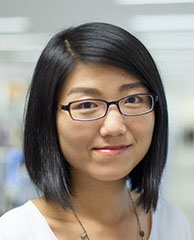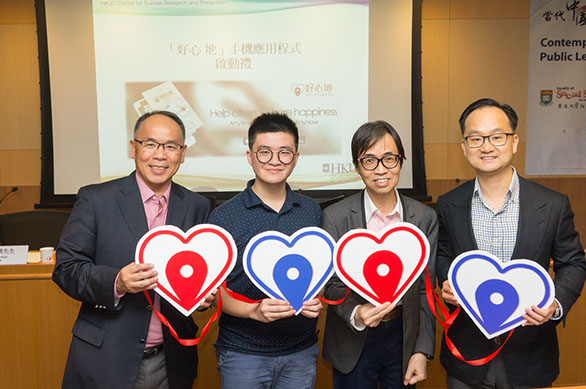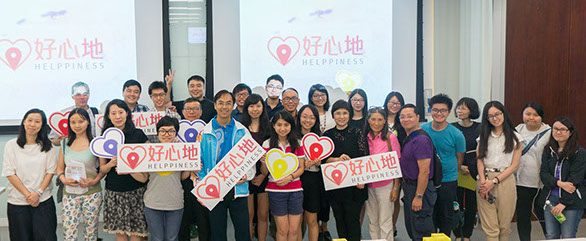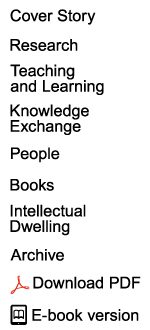A research project to compile an Altruism Index based on a survey of Hong Kong citizens’ behaviour found a strong link between helping others and feeling good about yourself. The survey was carried out by the Hong Kong Jockey Club Centre for Suicide Research and Prevention (CSRP) at HKU.
“It also found a strong correlation between offering help and being prepared to seek help yourself when you need it,” said Dr Emily Cheng Qijin, who is Research Assistant Professor at CSRP. “And that is very important in Hong Kong where asking for help is sometimes viewed as weakness. There is less stigma attached to seeking help if society is more helpful in general.
“To put this into context: over the past few years Hong Kong has not been seen as a happy place – in world happiness rankings we rate low, and there has been a rise in the number of youth suicides. Our research team felt it was time to address this and ask pertinent questions – Should we be rethinking our lifestyle? How do we rectify the situation?”
An initial Altruism Survey was carried out in 2014, commissioned by the Government and funded by the Hong Kong Jockey Club. It was meant to be a one-off, but was so well-received that the CSRP decided it was worthwhile doing more. The most recent one is part of an ongoing three-year project which began in September, 2016, and was funded by the Chow Tai Fook Charity Foundation.
Principal Investigator in the research team was Paul Yip, Director of the CSRP and Chair Professor in the Department of Social Work and Social Administration. Dr Cheng conceived the ideas and they had two research assistants helping actualise them.
“I did a systematic review of all the literature on similar surveys in other countries and discovered that most are either outdated or inapplicable to Hong Kong,” said Dr Cheng. “For instance, there is a validated scale originally developed in the US, which includes one item asking whether the respondent would help push a stranger’s car out of the snow. When it was introduced to India, that item was modified into ‘A stranger’s scooter is stuck in a pit. Would you help him/her take it out?’ The Hindi version has been further translated into Chinese in 1990s. However, neither the car nor the scooter situation is applicable to Hong Kong now.”
In order to develop a new survey that would be both up-to-date and relevant to local people and thereby render a useful Altruism Index, the team brought together a panel of local experts – two from HKU and two from NGOs – to suggest more pertinent ideas.
The team has already published one peer-reviewed paper and two survey reports on the results, to validate the Index and to show that the research is robust. More papers are under preparation. They found a stark correlation between a high score on the Altruism Index and a person’s well-being. “It seems that the saying ‘to help others is to help yourself’ has more truth to it than we knew – the Index suggests you get a definite sense of well-being from helping others,” said Dr Cheng.

![]() [The survey] also found a strong correlation between offering help and being prepared to seek help yourself when you need it. And that is very important in Hong Kong where asking for help is sometimes viewed as weakness.
[The survey] also found a strong correlation between offering help and being prepared to seek help yourself when you need it. And that is very important in Hong Kong where asking for help is sometimes viewed as weakness. ![]()
Dr Emily Cheng Qijin
More caring society
Dr Cheng feels too that the very existence of an Altruism Index can also make people have a more objective understanding of the society’s altruism level and be more optimistic in general. “I hope we can continue to do the Index, as I feel that it also serves to improve people’s sense of well-being. The latest survey showed marked improvement in helpful behaviour in Hong Kong, however, the survey respondents continuously perceived society’s overall altruism level lower than their own altruism level. I think it is important to inform people about this as it gives them a boost knowing they are part of a more caring society. It also serves as a reminder of where society is strong in altruism and the areas that need improvement.”
What also emerged from the original survey was that many people said they would like to help in the community more, but didn’t know how to volunteer their services. This revelation led the team to develop ‘Helppiness’ – a mobile application on opportunities to help. It covers everything from volunteer work, flag day collections and blood donation to daily acts of kindness, and provides direct links to the organisers so users can volunteer.
An unexpected outcome of the app has been a collaboration with the Hong Kong Red Cross. “They contacted us when they saw reports in the media about the survey, which found local people’s participation in blood donation is relatively low. They asked us to work with them to help promote their blood donation service,” said Dr Cheng. “Every day the Hong Kong Red Cross puts out a notice indicating which types of blood stocks are low and asking people of that type to donate. But it seems very few people even know of the existence of this daily notice. Now we have added it to our app in the hope this will raise awareness and encourage more people to give blood.”
The mobile application ‘Helppiness’, developed by the Hong Kong Jockey Club Centre for Suicide Research and Prevention, serves as a platform to provide information on helping opportunities including volunteer work, flag day collections, blood donation, and daily acts of kindness.
Professor Paul Yip (first from left), Mr Patrick Tsang On-yip (first from right), Governor of the Chow Tai Fook Charity Foundation, and two volunteers at the Hong Kong Altruism Index release and mobile application ‘Helppiness’ launch ceremony.
A group photo with project participants.

Pay It Forward
A study into the links between a person’s altruistic behaviour and his or her sense of well-being suggests that to help others is indeed to help yourself.
Next





